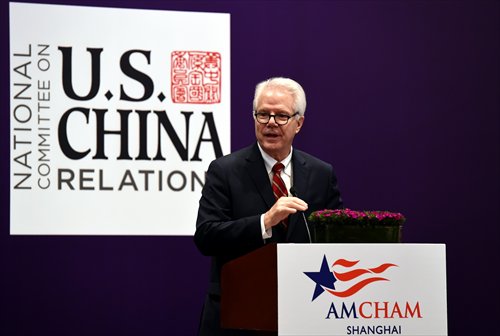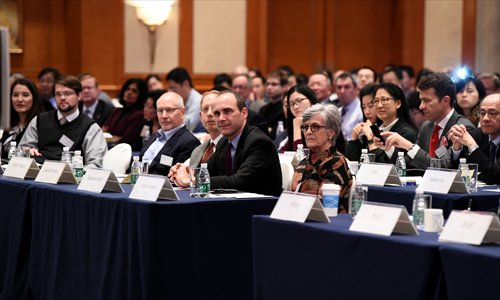HOME >> METRO SHANGHAI
Power relations
By Yang Lan Source:Global Times Published: 2015-12-3 19:38:11
In 1990, David M. Lampton, then-president of the National Committee on United States-China Relations, invited then-mayor of Shanghai Zhu Rongji and a delegation of officials to tour the US. Lampton, Zhu and the delegation traveled from the West Coast to the Great Lakes in the north, then over to the East Coast.
Despite US-China political relations being tense at that time, the friendly tour helped start new dialogue between the two countries, marking the beginning of the recovery of bilateral ties that continues to ensure.
Today, Lampton is a Hyman Professor and Director of China Studies at the Johns Hopkins University School of Advanced International Studies. He recently visited Shanghai to speak at the Barnett-Oksenberg Lecture hosted by the National Committee on US-China Relations, the Shanghai Association of American Studies and the American Chamber of Commerce in Shanghai, and share his views on the current challenges in the US-China relations.
On human links
It was human links that made the Chinese delegation's trip to the US happen. Human links also encouraged president Jimmy Carter to normalize relations with China.
"I remember a dinner with President Carter. He traced his commitment to the US-China relations to his childhood and to a rural church in Georgia where every Sunday he put in a nickel for donations around the world including China. He also encountered China in 1949 as a naval officer going in to Qingdao harbor. I remembered talking to him about what a different impression that made," said Lampton. "We often think that presidents are moved by big events and great strategic ideas. But I came to the conclusion after listening to him that what really motivated him was the impression he had of the Chinese people from the 1940s."
Human links have helped China and the US following the normalization of US-China relations in 1979. As a result, many important developments have been made, including progress in climate change cooperation, military-to-military exchanges and bilateral economic growth.
Chinese investment in the US created 80,000 American jobs in business related to China, and hundreds of thousands of Chinese students are contributing to and taking advantage of American education. Other accomplishments include Chinese President Xi Jinping's visit to the US.
However, Lampton believes that the strategic direction of US-China relations is not healthy.
On mutual strategic suspicions
It was security that brought the US and China together. But now, security has become negative in the relationship, creating the danger of militarization. This kind of strategic change will affect the bilateral economic, cultural and diplomatic relations too.
"Underneath recent developments are deepening mutual strategic suspicions," said Lampton. "The center of gravity in both capitals has shifted from a vocabulary of partnership and strategic cooperation to a deterrence vocabulary. Fundamental to a deterrence vocabulary is threat and establishing credibility, and the urge is seeing big problems at stake in small matters."
The US and China solidify outposts in the Asian region through alliance strengthening and long-term agreements. In terms of power ties, both countries are hoping to restrain each other through triangulating and balancing arrangements with other powers.
"A few years ago I had the privilege of meeting Yang Liwei, China's first person to go to space. I recall thinking how much better off we would be if space were a zone of Sino-American cooperation. In the new film The Martian, a Chinese space program provided assistance to American astronauts in difficulty," said Lampton. "But my dream only seems to be true in Hollywood. Outside the movie theaters we are in a downward strategic drift that demands our reflection into our actions."
On changing power relationships
Lampton believes that changing strategies are due to the shift in international power relationships. "This does not mean that the US is becoming more poor or weaker. But changes in relative power do have consequences. These changes mean that the quest for primacy by the previous dominant power, the United States, will become progressively more difficult and less tolerable to the ascending power."
Lampton believes that changing power relationships require each power to reserve stability. The US must make room for China in the established world and at regional institutions such as the World Bank and the United Nations. At the same time, China has to be more patient so that the international system can adapt to a stronger China.
Furthermore, Lampton believes that US-China relations today are society-to-society relations. Ties at corporate, NGO, and individual levels should be fully strengthened and nurtured. He urges China to establish immediate rules to govern its social organizations and foreign NGOs while caring not to damage them.
"As the Chinese proverb says, 'Those who drink the water should remember those who dug the well.' History often speaks in terms of elites and national leaders, and they are important. But also essential is the vision of the local leaders, our private and non-state leaders, our citizens," said Lampton.


Despite US-China political relations being tense at that time, the friendly tour helped start new dialogue between the two countries, marking the beginning of the recovery of bilateral ties that continues to ensure.
Today, Lampton is a Hyman Professor and Director of China Studies at the Johns Hopkins University School of Advanced International Studies. He recently visited Shanghai to speak at the Barnett-Oksenberg Lecture hosted by the National Committee on US-China Relations, the Shanghai Association of American Studies and the American Chamber of Commerce in Shanghai, and share his views on the current challenges in the US-China relations.
On human links
It was human links that made the Chinese delegation's trip to the US happen. Human links also encouraged president Jimmy Carter to normalize relations with China.
"I remember a dinner with President Carter. He traced his commitment to the US-China relations to his childhood and to a rural church in Georgia where every Sunday he put in a nickel for donations around the world including China. He also encountered China in 1949 as a naval officer going in to Qingdao harbor. I remembered talking to him about what a different impression that made," said Lampton. "We often think that presidents are moved by big events and great strategic ideas. But I came to the conclusion after listening to him that what really motivated him was the impression he had of the Chinese people from the 1940s."
Human links have helped China and the US following the normalization of US-China relations in 1979. As a result, many important developments have been made, including progress in climate change cooperation, military-to-military exchanges and bilateral economic growth.
Chinese investment in the US created 80,000 American jobs in business related to China, and hundreds of thousands of Chinese students are contributing to and taking advantage of American education. Other accomplishments include Chinese President Xi Jinping's visit to the US.
However, Lampton believes that the strategic direction of US-China relations is not healthy.
On mutual strategic suspicions
It was security that brought the US and China together. But now, security has become negative in the relationship, creating the danger of militarization. This kind of strategic change will affect the bilateral economic, cultural and diplomatic relations too.
"Underneath recent developments are deepening mutual strategic suspicions," said Lampton. "The center of gravity in both capitals has shifted from a vocabulary of partnership and strategic cooperation to a deterrence vocabulary. Fundamental to a deterrence vocabulary is threat and establishing credibility, and the urge is seeing big problems at stake in small matters."
The US and China solidify outposts in the Asian region through alliance strengthening and long-term agreements. In terms of power ties, both countries are hoping to restrain each other through triangulating and balancing arrangements with other powers.
"A few years ago I had the privilege of meeting Yang Liwei, China's first person to go to space. I recall thinking how much better off we would be if space were a zone of Sino-American cooperation. In the new film The Martian, a Chinese space program provided assistance to American astronauts in difficulty," said Lampton. "But my dream only seems to be true in Hollywood. Outside the movie theaters we are in a downward strategic drift that demands our reflection into our actions."
On changing power relationships
Lampton believes that changing strategies are due to the shift in international power relationships. "This does not mean that the US is becoming more poor or weaker. But changes in relative power do have consequences. These changes mean that the quest for primacy by the previous dominant power, the United States, will become progressively more difficult and less tolerable to the ascending power."
Lampton believes that changing power relationships require each power to reserve stability. The US must make room for China in the established world and at regional institutions such as the World Bank and the United Nations. At the same time, China has to be more patient so that the international system can adapt to a stronger China.
Furthermore, Lampton believes that US-China relations today are society-to-society relations. Ties at corporate, NGO, and individual levels should be fully strengthened and nurtured. He urges China to establish immediate rules to govern its social organizations and foreign NGOs while caring not to damage them.
"As the Chinese proverb says, 'Those who drink the water should remember those who dug the well.' History often speaks in terms of elites and national leaders, and they are important. But also essential is the vision of the local leaders, our private and non-state leaders, our citizens," said Lampton.

David Lampton speaks in Shanghai recently on Sino-US relations.

Hanscom Smith, US Consul General in Shanghai (second from right), is among the attendants at the lecture.
Photos: Courtesy of AmCham Shanghai
Posted in: Metro Shanghai